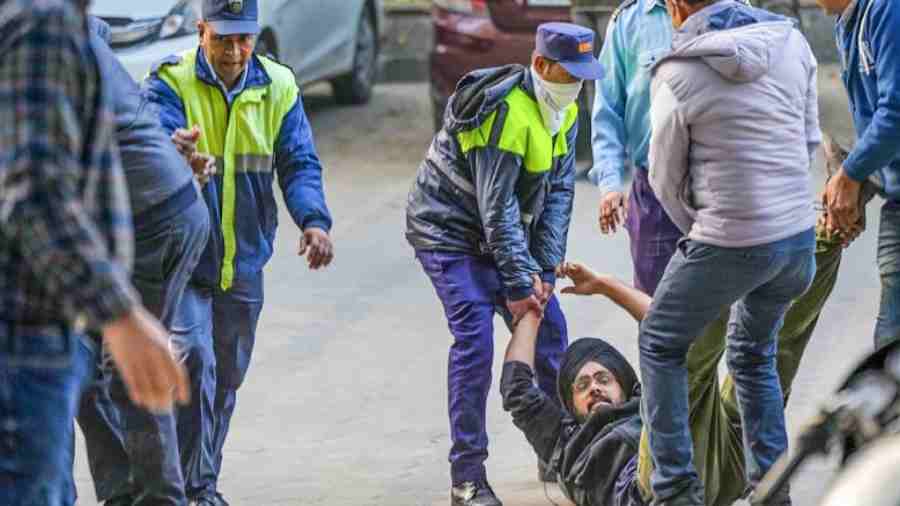Police and security guards on Friday dragged students away from the Arts Faculty premises at Delhi University to prevent them screening the BBC documentary, India: The Modi Question, or even watching it together on laptops. Twenty students were detained.
Over the past few days, universities have resorted to threats of disciplinary action, allegedly effected power cuts and snapped Wi-Fi, and called in the police to prevent student bodies from organising mass viewing of the film on campus.
Leftist student groups and the Congress-backed NSUI had announced that the documentary — which criticises Narendra Modi’s role as chief minister during the 2002 Gujarat riots — would be screened at 5pm in front of the Arts Faculty at Delhi University.
Before the students could start the projector, university authorities called the police and sent security guards to disrupt the event. The guards and the police dragged students away from the spot.
When some other students tried to watch the film on laptops on the Art Faculty premises, the police and the guards returned to forcibly remove them too.
Many students ran away for fear of getting arrested.
Anjali, a member of the CPIML Liberation-backed All India Students Association, said the students detained by the police included several women, two of whom had not been released till 7pm. Under the rules, detained female students have to be released before sunset, which occurred at 5.56pm in Delhi on Friday, according to the India Meteorological Department website.
Later in the evening, all the students were released.
According to reports, the government last week directed YouTube and Twitter to block access to the documentary, but links to the film are available on certain social media platforms.
“The film has not been banned. We wanted to screen it so we could discuss the issue. We were not indulging in violence or any illegal act,” said Manik Gupta, a second-year LLB student at the university’s Law Faculty.
“The RSS is organising protest shakhas on the campus. Their activities have nothing to do with academics, yet they are not being stopped. But the screening of a film has become a big issue (for the authorities).”
The CPM-backed Students Federation of India (SFI) had arranged a screening at Ambedkar University here, despite the university denying permission and ABVP members organising a protest, but a power cut scuttled the event.
The students, however, went ahead and watched the documentary on laptops and mobile phones in the open near the canteen.
The SFI alleged that students had not been allowed to enter the campus while the screening was going on in the afternoon. Later, a group of students held a meeting at the university’s main gate to protest the actions of the administration and the ABVP.
Leftist students at JNU too had had to watch the documentary on their mobile phones on Tuesday after power went off, for which the students blamed the administration. They also alleged stone-throwing by the ABVP, which denied the charge.
In Jamia Millia Islamia, students were detained by police on Wednesday to thwart a screening of the film. Some of the students were released only on Thursday.
Anjali, the Leftist student, said that universities stand for debate, dissent and discussion but this culture of free speech was being crushed. “If students cannot watch a film which has not been banned, you can imagine the extent of the censorship raj,” she said.
Screening of the film at Panjab University — an institution in Chandigarh funded by the central government and the states of Punjab and Haryana — was stopped midway on Wednesday by the administration. The NSUI had organised the screening but the administration called the police.











